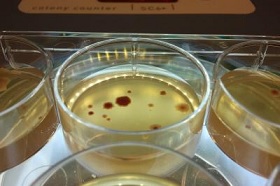Resistance more likely with ‘lonely’ bacteria
‘Lonely’ bacteria are more likely to mutate and, therefore, develop resistance than bacteria in large groups. This is shown by research from dr. Rok Krašovec and his colleagues at The University of Manchester, published this week in Nature Communications.
Resistance
The researchers were looking at the connection between the environment and the ability of the E. coli bacteria to develop resistance to antibiotics. They found that the mutation rate is dependent of the amount of bacteria; the higher the density, the lower the mutation rate. In addition, they found that ‘lonely’ bacteria developed faster greater resistance to the antibiotic Rifampicine. A surprising result, according to the researchers.
Quorum sensing
Bacteria control their mutation rate via quorum sensing. This is a form of social communication through signaling molecules by which they let each other know what the bacteria concentration is. These released molecules help the microbes to understand the environment and coordinate their behavior, so that they can improve their defense mechanisms and adapt to the availability of nutrients.
According to the researchers, the results could mean that bacteria manipulate each other’s mutation rate through quorum sensing. They suggest that the rate will be affected a decrease in density, for example, in persons taking antibiotics.
The mutation rate seems to be depended of the gen Luxs. Luxs is involved in quorum sensing in various bacteria. The researcher now want to investigate how the mutation rate is controlled.
Source: Nature Communications, Wellcome trust







